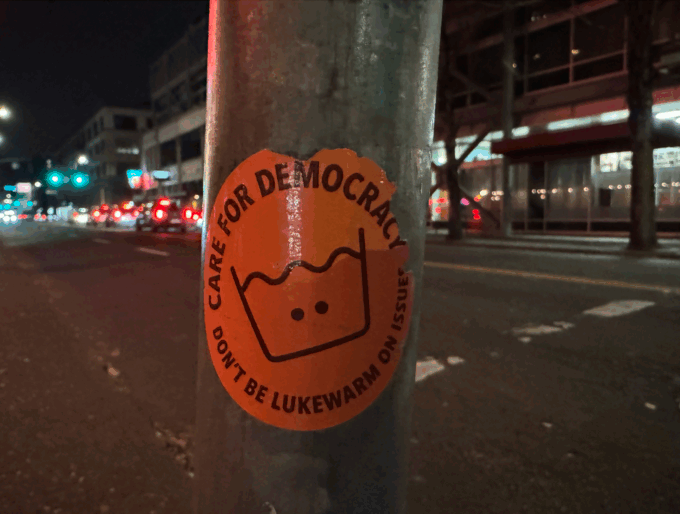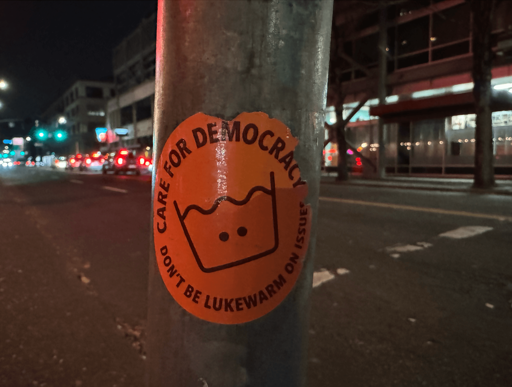
Photograph by Nathaniel St. Clair
Two weeks ago, the Senate passed three resolutions to end tariffs on Brazil, Canada, and globally that the Trump administration unilaterally imposed without consulting Congress. However, these Senate actions are largely symbolic, serving as another example of how a dysfunctional Congress abdicating its constitutional legislative responsibilities empowers an incredibly powerful presidency.
Under the Constitution, Congress has the power to make laws and levy taxes and duties on imports. In comparison, the executive branch – led by the president – enforces those laws. Yet, presidents have significant power to create policy themselves when Congress passes laws giving them wide authority.
In this case, President Trump imposed tariffs claiming authority granted by the 1977 International Emergency Economic Powers Act (IEEPA) by declaring national emergencies. The legal legitimacy of this claim is uncertain, as no president has used IEEPA to impose tariffs and the US Court of Appeals for the Federal Circuit affirmed a lower court opinion that the tariffs exceeded President Trump’s authority. Last week, the Supreme Court heard arguments in a case deciding whether the IEEPA gives the president such unilateral authority to issue tariffs through the pronouncement of what he deems to be a national emergency.
The court system is and has been a primary check on the power of the presidency. However, the American constitutional system relies on all three branches keeping each other in check. The case of tariffs further shows how Congress fails to restrict the Executive Branch, giving the president immense power.
Supreme Court Justice Neil Gorsuch further highlighted this dynamic during oral arguments over the tariffs case. He warned that Congress deleting its core authorities to the president would be “a one-way ratchet toward the gradual but continual accretion of power in the executive branch and away from [Congress].”
While the Senate passed the three resolutions calling for the end to the national emergencies President Trump used to issue tariffs, those resolutions have to pass both houses of Congress. Yet, House Republicans have fought to block such tariff resolutions from going to the House floor. Thus, the Senate resolutions are effectively stuck.
Congressional Republicans Put Loyalty to Trump Over Constitutional Duties
The founders designed the Constitution for the three separate branches to act in their interests as branches to check each other. A key flaw widely pointed out by scholars – and even warned about by George Washington – is the problem of partisanship (or factionalism according to Washington) obliterating that dynamic.
With tariffs, House Republican leadership is acting more out of loyalty to the Republican Party and specifically its leader, President Trump, than any loyalty to the integrity and responsibilities of the legislative branch. This phenomenon is not unique to the present case, showing the Congress’ willingness to abdicate its responsibility out of loyalty to a party or faction.
Even if the House GOP brought all three of the resolutions to the floor and the House passed them, they still would likely have no impact. The Constitution affords the president the ability to veto rather than sign passed bills. The House and the Senate would have to vote in favor of overriding the president’s veto with at least a two-thirds majority in each chamber. Only a handful of Republicans voted with Democrats to pass these resolutions with votes in favor not exceeding 52, meaning at least 15 other Republicans would have to switch their vote against the wishes of President Trump.
Without a congressional supermajority, the courts are the only avenue to check the president outside of public pressure. Even if the Supreme Court strikes down President Trump’s tariffs, the tariffs would have still existed for months. Tariffs have significantly affected the economy through raising prices, disrupting international trade, and encouraging other countries to form trade alliances without the United States.
Additionally, President Trump has used the existence and threat of tariffs to barter with corporate and foreign actors. For example, he negotiated deals with individualpharmaceutical companies to lower drug prices, albeit in an extremely limited manner that won’t impact most Americans.
Trump has also used tariffs as a tool when trying to negotiate deals with foreign countries like Canada and India. President Trump’s negotiations with foreign leaders have involved personal favors. For example, he wanted Indian Prime Minister Narendra Modi to nominate him for a Nobel Peace Prize.
Congressional Inaction Empowers Abuse of Executive Authority
Ultimately, the current system encourages the president to take unilateral action, interpreting existing laws in ways to grant him immense power. Congress’s lack of will to challenge this power grab forces the issue onto the court system, which can take months and even years to make decisions. In the meantime, the president’s unilateral action becomes policy.
The Supreme Court further strengthened this reality in Trump v. CASA, Inc. (2025). The decision granted relief to the Trump administration from nationwide injunctions from lower courts when such injunctions “are broader than necessary to provide complete relief to each plaintiff with standing to sue.” The Court wrote that “[u]niversal injunctions likely exceed the equitable authority that Congress has given to federal courts.”
This issue of congressional abdication goes far beyond tariffs. Perhaps the greatest example of presidential power exceeding the original intents of the Constitution are war powers. The Constitution gives Congress the power to declare war, not the president. Yet presidents have engaged in numerous international conflicts without Congress declaring war or even passing lesser authorizations like it did for the wars in Afghanistan and Iraq, and this dynamic grew following the terrorist attacks on September 11, 2001.
For example, President Barack Obama was able to illegally attack Libya in 2011 without congressional approval as required under the War Powers Resolution. The administration completely incorrectly argued that the Constitution imbued him with the independent authority to take military action if he deemed the use of force was in the national interest. Even though President Obama violated the Constitution and the congressionally passed War Powers Resolution, Congress took no action to stop him.
Former president and Founding Father James Madison warned that “parchment barriers” were not sufficient in guarding “against the encroaching spirit of power” between the branches of government. Congress’s abdication of using its war powers shows what that warning looks like in reality.
As what could happen with the tariff dilemma, Congress did call on the War Powers Resolution to stop the first Trump administration from backing Saudi Arabia in its war against Yemen, where human rights groups like Amnesty International calledout the US-backed coalition for war crimes. Even though majorities from both houses of Congress passed the resolution, President Trump vetoed it and there were not enough votes to override the veto.
The absence of congressional action does not only fail to stop presidents from exercising immense power, it encourages it. After congressional Republicans openly made it known their mission was to prevent President Obama from pushing bills through Congress during his administration, Obama promised to use the power of the pen.
What Obama meant reflects what presidents have turned to when circumventing Congress: issuing executive actions to create policy rather than push for legislative change.
For reference, President Trump has issued significantly more executive orders than President Obama even though he has held office for less time, showing the bipartisan nature of this phenomenon.
When Congress abdicates its legislative responsibilities, policymaking shifts to the many executive departments and agencies, testing the limits of their congressionally authorized powers. This reality results in an ever-increasing swath of rules and regulations in place of legislation, enlarging the federal bureaucracy, limiting the scope of what can be accomplished, and leaving it to the courts to decide if executive actions are legal.
While tariffs specifically – rightfully so – are a main focus for policymakers and the media, this episode in the exercise of unilateral presidential power just highlights an already-existing, existential problem for the American constitutional Republic and a functioning democratic system of government.
This first appeared on CEPR.
The post Tariff Disputes Highlight Deeper Problems With US Democracy appeared first on CounterPunch.org.
From CounterPunch.org via this RSS feed


